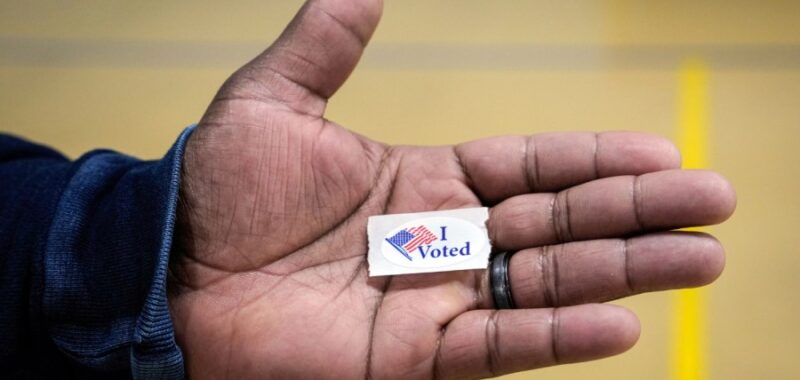
As the dust settles on this pivotal election, the nation’s eyes turn to what these results mean — not just for policy, but for the future of our communities.
For Black America, the implications are significant, and the question remains: How will our interests be prioritized, and where do we position ourselves to harness our collective power?
The 2024 election, with its passionate debates and high stakes, has revealed a nuanced shift in the political outlook of Black voters. Many supported the Democratic ticket, led by Vice President Kamala Harris, yet motivations this time around proved to run deeper and broader than simple party loyalty. Increasingly, Black voters are focused on core issues: economic opportunity, community safety, educational access, and the preservation of strong, foundational values.
These are not just talking points; they are at the very heart of our aspirations for a future that uplifts, protects and empowers every facet of Black life.
On account of many the during campaign season expressing a sincere openness to different political alternatives to achieve those ends, the days of the Black electorate being perceived as a monolithic bloc are behind us. Today, we are witnessing a rising, rich diversification of thought, strategy and vision. Leaning into ideas and approaches that enable us to not only remain relevant but to exercise a measure of leverage within a national electorate shifting rightward is not only politically expedient, it’s essential to our survival.
That said, it is time to contemplate a recalculation of how we position ourselves politically. Is over-indexing to one side or the other in perpetuity the best way to move forward? As they say, “It’s chess, not checkers.”
It’s time to shift from thinking in binary terms of “us versus them” and instead approach politics with the mindset of a chess player: strategically, several moves ahead. The challenges we face transcend party lines. While our historical loyalties run deep, issues such as economic inequality, educational gaps and under-resourced communities persist, regardless of which party holds power.
This election season has highlighted a crucial reality: real progress requires more than partisanship. It demands a commitment to holding accountable all who seek our support, engaging with allies who may not share our background but can share our goals. Politics at its core is a game of addition, not subtraction. Influence is built through relationships, respect and a willingness to engage beyond our comfort zone.
As we look ahead, a pragmatic approach to politics — focused on coalition-building and intentional alliances — will better serve us in advancing a prosperous future defined by opportunity and stability.
In this climate, clinging rigidly to one side risks isolating us from critical opportunities. Wholesale rejection of those with differing views may feel satisfying in the moment, but it risks marginalizing our influence when we need it most. If we want to ensure our issues remain a priority, we must move beyond reflexive loyalty and adopt a broader, more strategic perspective.
To maximize our impact, we must be prepared to build new coalitions that strengthen our leverage, both within and beyond the familiar political circles. This doesn’t mean compromising our values; it means expanding our capacity to secure allies who can support our mission. Our goal should be to cultivate a network of partnerships that advances economic empowerment, prioritizes safety and creates educational opportunities across our communities. It is about working alongside those who may not look like us but who are invested in common goals — leaders willing to work toward solutions that benefit us all.
Every election cycle offers an opportunity to recalibrate and consider what’s most effective for advancing our community’s goals. This requires a willingness to reevaluate and, at times, recalibrate how we position ourselves in the political arena. The measure of political wisdom lies not in over-committing to one side but in developing a sophisticated, adaptive approach to engagement that serves our best interests.
Our future depends on our ability to navigate the complexities of an evolving political landscape, drawing on both new paradigms and time-tested principles. As a community, we have the strength to set a new standard of engagement — one that transcends party affiliations and situates us as a critical force shaping national policy. Black America has always been an integral part of the American story. Now, we must also be seen as indispensable partners in its future.
As we enter this new chapter, let’s embrace the power that comes from engagement, coalition-building and mutual respect. It’s time to move forward with clarity, purpose and a commitment to the kind of political engagement that ensures our voices are heard and our interests are met. With a united, strategic approach, we can position ourselves as shapers of the national discourse, ensuring that our values and priorities are not only acknowledged but championed at every table where decisions are made.
The future belongs to those who seize it with wisdom and purpose. Let us approach this next chapter with the clarity to know what we want, the prudence to build alliances that strengthen us, and the conviction to shape policies that serve Black America. The road ahead may be challenging, but it is filled with potential. Together, we can set a new standard for what it means to lead — not only within our communities but across this nation we all share.
Darius Jones is founder and president of the National Black Empowerment Council and a member of the ForbesBLK Advisory Council. Previously, he served as deputy national political director for Michael Bloomberg’s 2020 campaign.

